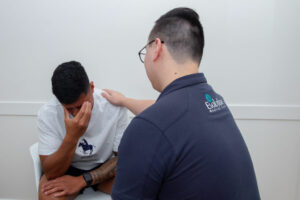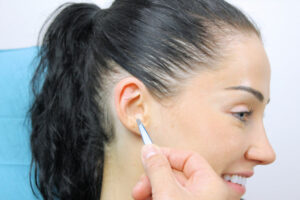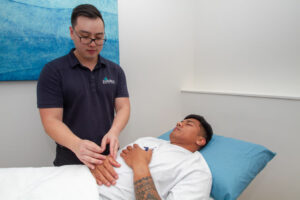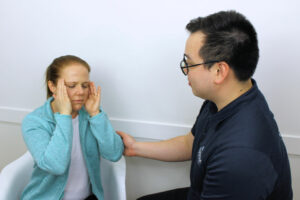Quick Summary
Vertigo is a balance disorder often caused by inner ear issues or neurological conditions. Symptoms include dizziness, nausea, and unsteadiness, impacting daily life. Common triggers include certain head movements, dehydration, stress, and poor sleep.
Natural therapies like Acupuncture, Auriculotherapy, Vestibular Acupressure, and dietary modifications can help restore balance and reduce symptoms. Lifestyle changes—staying hydrated, managing stress, improving sleep, and mindful movement—also play a key role. Professional assessment ensures the best treatment approach. If vertigo is affecting you, personalised care can help you regain stability and improve your quality of life.
Have you ever experienced a sudden sensation that you’re spinning, or that the world around you is spinning, even when everything is still? If so, you might be dealing with vertigo – an unsettling condition that can make even the most straightforward tasks feel like a balancing act. Vertigo isn’t just about dizziness; it can significantly impact your quality of life, causing symptoms such as balance problems, nausea, and even difficulty standing or walking.
In this article, we delve into the world of natural therapies for vertigo. Aiming to help you better understand this condition, its common triggers, and most importantly, how you can manage and potentially overcome it using a range of natural therapies. We are all unique, and sometimes a natural approach may offer the balance your body and mind need to alleviate vertigo symptoms.
Understanding Vertigo
Vertigo is a symptom rather than a condition itself. It’s the sensation of feeling off-balance, leading to dizziness. It’s often due to a problem in the inner ear or brain, areas responsible for processing sensory information – including balance.
To understand vertigo better, it’s important to know that there are two main types: peripheral vertigo and central vertigo.

Peripheral Vertigo
Peripheral vertigo, the most common type, is usually caused by problems in the inner ear, which plays a crucial role in maintaining balance. The inner ear has a complex system of fluid-filled channels called the vestibular system. These channels are highly sensitive to movement and changes in your head position. They send signals to your brain about your body’s position and motion.
When these signals are disrupted due to an issue in the inner ear, it confuses your brain and results in vertigo. Common conditions that cause peripheral vertigo include:
- Benign Paroxysmal Positional Vertigo (BPPV): Tiny calcium particles clump up in the inner ear, causing brief episodes of mild to intense dizziness. BPPV can occur when changing your head position relative to gravity, such as tipping your head up or down, lying down, or turning over in bed.
- Meniere’s Disease: This is an inner ear disorder thought to be caused by a buildup of fluid and changing pressure in the ear that can cause episodes of vertigo along with ringing in the ear (tinnitus) and hearing loss.
- Vestibular Neuritis or Labyrinthitis: Inflammation caused by an infection, often viral, results in dizziness and loss of balance. The inflammation is usually in the inner ear around nerves that are key to the body’s sense of balance.
Central Vertigo
Central vertigo is much less common and is caused by problems in the brain, usually in a specific area called the cerebellum, located at the base of the brain. The cerebellum is involved in coordination and balance, and disturbances in these areas can lead to vertigo. Conditions that cause central vertigo include:
- Migraines: Some people may experience vertigo and other types of dizziness before or during migraines.
- Multiple Sclerosis: This is a disease of the nervous system that causes a wide range of symptoms, which can sometimes include vertigo.
- Stroke or Transient Ischemic Attack (TIA): A stroke or “mini-stroke” can cause sudden vertigo. This is a very serious condition and would often be accompanied by other symptoms like difficulty speaking, coordination problems, and severe balance issues.
The symptoms of vertigo can feel very disconcerting, but with the right treatment, most people can effectively manage this condition. Understanding the root cause of vertigo is crucial in finding the most effective treatment strategy.
The good news is, there are several natural therapies and strategies you can implement to manage vertigo. Let’s first look at the triggers before exploring the possible solutions.
Common Triggers of Vertigo
The key to managing vertigo naturally is understanding what might trigger your symptoms. Triggers can vary greatly from person to person, and it can be helpful to keep a record of your vertigo episodes to identify patterns or recurring triggers. Some common triggers include:
- Certain head movements or positions
- Dehydration
- Stress or anxiety
- Lack of sleep
- Certain medications
- High levels of salt in the diet
- Alcohol or caffeine
Remember, it’s important to seek professional help if you’re experiencing symptoms of vertigo, as it can sometimes signal underlying health problems that need urgent attention.
Evidence-Based Natural Therapies for Vertigo
Natural therapies are increasingly being recognised in the scientific community for their role in managing and even preventing various health conditions, including vertigo. Let’s explore some of these evidence-based natural therapies that may help if you are struggling with vertigo:
1. Acupuncture
This practice involves the insertion of very fine needles into specific points on the body to restore balance and promote healing. In terms of vertigo, Acupuncture is believed to work by stimulating areas of the brain that control the sensations of balance and spatial orientation. According to research, Acupuncture may help improve symptoms associated with vertigo, such as dizziness, unsteadiness, and tinnitus. Furthermore, its stress-relieving benefits can also be beneficial in managing vertigo symptoms that are triggered by stress or anxiety.
2. Auriculotherapy
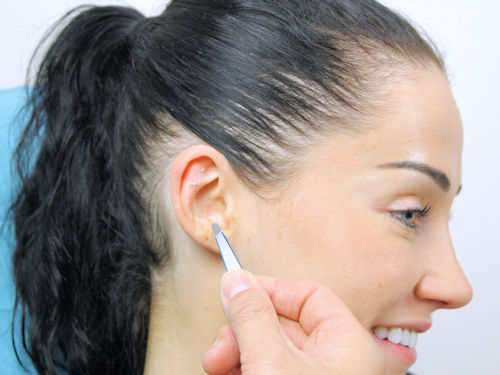
Also known as ear Acupuncture, Auriculotherapy is a technique where stimulation is applied to specific points on the outer ear to alleviate health conditions in other parts of the body. The outer ear is considered a microsystem that mirrors the entire body. Stimulating these points has been shown to stimulate reflex-relieving effects in corresponding parts of the body. For vertigo, especially conditions like BPPV, Auriculotherapy can be quite effective. In fact, scientific studies suggest that Auriculotherapy can significantly improve vertigo symptoms, as it helps to restore the inner ear’s balance function.
3. Vestibular Acupressure
Vestibular Acupressure involves the use of different manual therapy techniques to alleviate muscle tension and promote healing. This technique targets specific points on the body (vestibular points) that correspond to the body’s balance system, the vestibular system. Applying pressure to these points around the neck and head stimulates the body’s natural healing response to restore a sense of balance. This form of treatment can be beneficial for people suffering from vertigo, as it works directly with the body’s balance mechanisms.
4. Dietary Advice
Certain dietary modifications can significantly impact vertigo symptoms, especially in conditions like Meniere’s disease where fluid retention in the inner ear triggers vertigo. It is advised to maintain a low-sodium diet as sodium can promote fluid retention. Also, staying well-hydrated and limiting caffeine and alcohol intake can be beneficial. Adequate intake of certain vitamins like B6, C, and E, as well as magnesium, have been found to improve vertigo symptoms.
5. Healthcare Supplements
Certain supplements such as Ginkgo Biloba, which improves blood flow to the brain, and Omega-3 fatty acids, known for their anti-inflammatory properties, may be beneficial for vertigo symptoms. Remember, supplements should always be taken under the guidance of a healthcare provider to ensure safety and efficacy in your unique situation.
It’s essential to remember that while these natural therapies have shown promise in managing vertigo, everyone’s experience with vertigo is unique, and so the response to different therapies may vary. It’s crucial to involve healthcare professionals in your treatment journey, as we can guide you to utilise therapies that are most likely to benefit you.
Lifestyle Changes for Vertigo
A holistic approach to managing vertigo doesn’t stop at treatments. Your lifestyle significantly impacts your vertigo symptoms, and making certain adjustments can go a long way in managing this condition.
- Stay Hydrated: Dehydration can worsen symptoms of vertigo. Ensure you’re drinking enough water daily, especially in hot weather or after exercise.
- Be Mindful with Your Movements: Quick changes in head position or sudden movements can trigger vertigo. Try to make mindful, slow movements, especially when standing up from a sitting or lying position.
- Stress Management: Stress and anxiety can exacerbate vertigo symptoms. Incorporating stress management strategies, such as mindfulness, yoga, and deep-breathing exercises, can be beneficial.
- Regular Exercise: Regular physical activity can help your body manage balance better and reduce episodes of vertigo. Balance exercises, in particular, can be useful.
- Adequate Sleep: Lack of sleep or a disturbed sleep pattern can worsen vertigo. Aim for 7-9 hours of quality sleep per night and maintain a consistent sleep schedule.
Do You Need Help with Vertigo?

Remember, while some lifestyle changes can be effective in managing vertigo, they are not a replacement for care from a healthcare professional, as there is a lot more that can be done to relieve your symptoms. If you’re experiencing ongoing vertigo, it’s crucial to consult with a healthcare professional.
As healthcare professionals, we can perform a thorough assessment to determine the cause of your vertigo, which is essential for guiding treatment. From there we can advise on suitable natural therapies and specific lifestyle modifications based on your individual situation and ensure these are safe and effective for you.
The Takeaway
Vertigo can be a distressing and debilitating condition, but it’s not something you have to live with. With the right combination of natural therapies and lifestyle changes, it’s possible to manage vertigo effectively.
Natural therapies such as Acupuncture, Auriculotherapy, Vestibular Acupressure, dietary modifications, and healthcare supplements, along with simple lifestyle adjustments, can make a significant difference in managing your vertigo symptoms. But always remember, there are a range of different causes of vertigo and with this in mind, every individual is unique and so the response to different therapies can vary. This is where seeing a healthcare professional comes in, so that we can guide you on what is going to help you the most.
The key is to understand your body, take active steps towards your health, and involve healthcare professionals in your journey. With this approach, you can gain control over vertigo and get back to what you love doing the most.
So if you or someone you know is dealing with vertigo, don’t let it hold you back. Reach out to my team on (02) 4709 6727 or book an appointment online, and let’s discuss how we can help in your situation.


